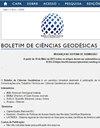Harmonizing income classes from 2000 and 2010 Brazilian censuses
IF 0.5
Q3 Earth and Planetary Sciences
引用次数: 0
Abstract
: Income variables from the Brazilian population census (IBGE) are often used as proxies for the population’s socioeconomic level in spatial analyses of urban segregation, inequality and social exclusion. However, income variables are dependent on reference values (minimum wage) that change over time, which can be challenging for multitemporal analysis. This paper discusses this issue and proposes a methodology to adjust income data that allows a meaningful comparison between the datasets of two Census periods. The methodology was applied to five medium-sized cities of the state of São Paulo by adjusting income data from Census 2000 and 2010 according to the period’s inflation rates. The analysis shows that the methodology mitigates the comparability issues. Results better reflect the changes in population composition and in residential patterns of different income groups that took place over the 2000s in Brazil in medium-sized cities协调2000年和2010年巴西人口普查的收入阶层
本文章由计算机程序翻译,如有差异,请以英文原文为准。
求助全文
约1分钟内获得全文
求助全文
来源期刊

Boletim De Ciencias Geodesicas
Earth and Planetary Sciences-General Earth and Planetary Sciences
CiteScore
1.70
自引率
20.00%
发文量
10
审稿时长
3 months
期刊介绍:
The Boletim de Ciências Geodésicas publishes original papers in the area of Geodetic Sciences and correlated ones (Geodesy, Photogrammetry and Remote Sensing, Cartography and Geographic Information Systems).
Submitted articles must be unpublished, and should not be under consideration for publication in any other journal. Previous publication of the paper in conference proceedings would not violate the originality requirements. Articles must be written preferably in English language.
 求助内容:
求助内容: 应助结果提醒方式:
应助结果提醒方式:


